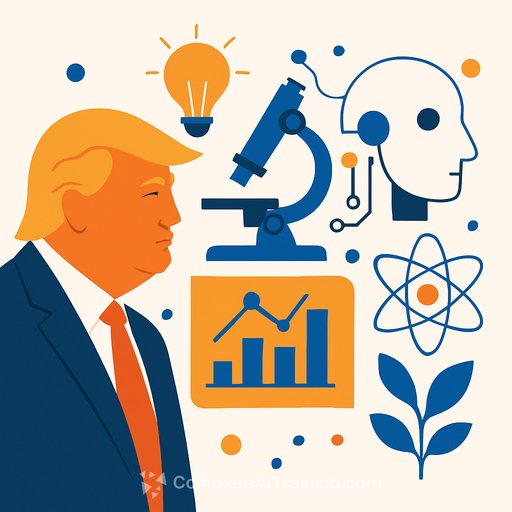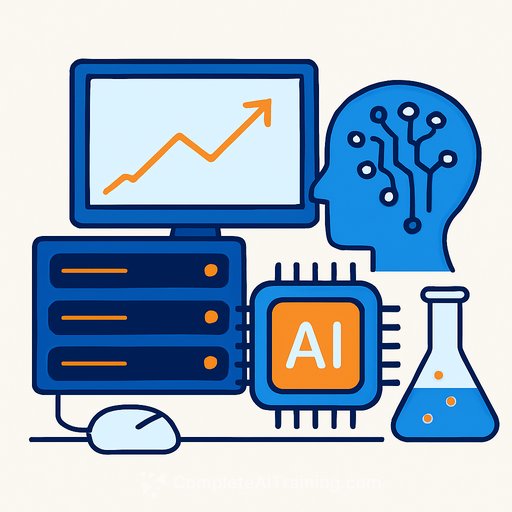Trump Administration’s AI Action Plan Focuses on Science and Research
The White House released an AI Action Plan last week outlining key objectives to advance scientific research through artificial intelligence. The plan emphasizes the creation of high-quality scientific datasets, expanding researcher access to large-scale computing resources, and automating laboratory processes.
In response, the National Science Foundation (NSF) announced upcoming initiatives, including the next phase of the National AI Research Resource (NAIRR) and new funding for AI Research Institutes targeting various scientific domains.
Coordinated Efforts Across Agencies
The plan assigns roles to several federal agencies. The Department of Energy (DOE) and the National Institute of Standards and Technology (NIST) are tasked with supporting AI model testing and evaluation. This directive follows a January executive order from President Donald Trump, which instructed the White House Office of Science and Technology Policy, led by Michael Kratsios, to develop the strategy.
Looking ahead, the plan points to an upcoming update of the National AI R&D Strategic Plan. Priorities include advancing theoretical, computational, and experimental AI research, as well as improving AI interpretability, control, and robustness. A critical element involves scaling experimentation through “automated cloud-enabled labs,” to be developed by DOE’s national labs in partnership with other agencies, research institutions, and private industry.
Encouraging Data Sharing and Quality Standards
Scientific datasets of exceptional size and quality are a cornerstone of the plan. It proposes that federally funded researchers disclose non-proprietary, non-sensitive datasets used in AI model development. Additionally, the impact of previously shared datasets will be considered during grant evaluations.
The National Science and Technology Council is encouraged to establish minimum data quality standards for AI training datasets. To facilitate secure data use, NSF and DOE will create “secure compute environments” similar to NSF’s National Secure Data Service demonstration project, providing controlled access to restricted federal data.
Expanding Access to High-Performance Computing
The plan highlights the importance of NSF’s National AI Research Resource in promoting open-source and open-weight AI models, which are vital for academic research and may set global standards. It calls for sustainable operations that connect researchers and educators to AI resources through partnerships with private sector entities and improvements in the financial market for large-scale computing power—currently unaffordable for many academics and startups.
Following the plan’s release, acting NSF Director Brian Stone announced that the NAIRR pilot, which began in January 2024 and is scheduled for two years, will enter its “next phase.” NSF also allocated $100 million in funding for five AI Research Institutes, including a new Cornell University-led institute focused on materials science. The AI Research Institute program currently supports 29 institutes, each receiving approximately $20 million over five years.
NSF plans to establish AI testbeds for transparent and rigorous evaluation of AI systems. A partnership is also underway to build large-language-model infrastructure aimed at accelerating AI applications in science.
Developing AI Standards and Evaluation Methods
NIST’s Center for AI Standards and Innovation is a key player in advancing the science of AI measurement and evaluation. Working with DOE and NSF, NIST organizes meetings for federal agencies and the research community to share best practices. It also publishes guidelines and resources to help federal agencies evaluate AI systems in alignment with their missions.
Michael Kratsios highlighted the challenge of measuring AI models, noting that current methods often rely on domain experts informally testing models. He emphasized the need for scalable, standardized evaluation approaches that could be adopted internationally. Kratsios also mentioned that Congress has an opportunity to provide statutory support for standard-setting bodies to strengthen these efforts long-term.
Supporting Workforce Development
The plan recommends that NSF and DOE expand workforce programs focused on AI. This includes increasing hands-on research opportunities for students, launching industry-driven training initiatives to meet workforce demands, and organizing an AI hackathon to engage top academic talent in testing AI systems for transparency, security, and control.
- Create more research training for undergraduates and graduates
- Develop industry-aligned training programs
- Coordinate AI hackathons focused on system evaluation
The administration continues to prioritize AI in budget requests for science agencies, even amid overall funding cuts. NSF’s budget proposal includes increased AI funding across multiple research directorates, although some of those directorates face significant reductions.
For those interested in deepening their AI expertise in scientific contexts, exploring courses and certifications related to AI for science can be valuable. Resources like Complete AI Training offer specialized programs that align with current research needs.
Your membership also unlocks:





